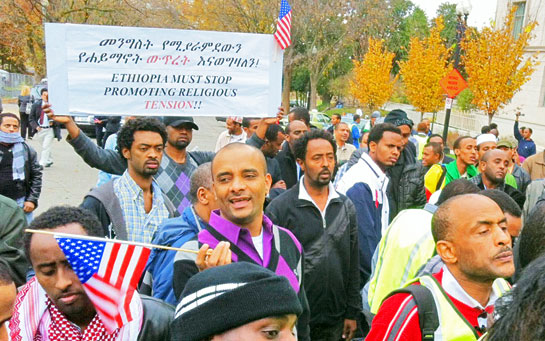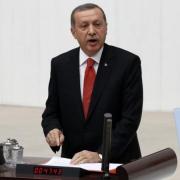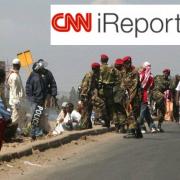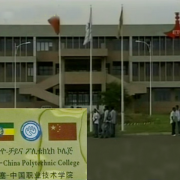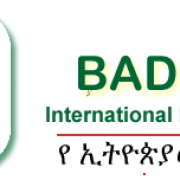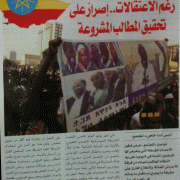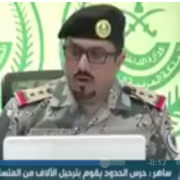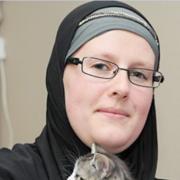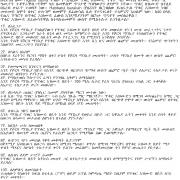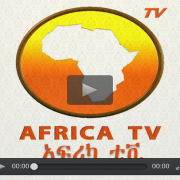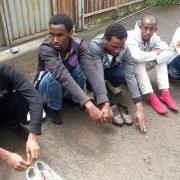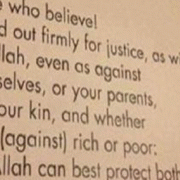Ethiopian Muslim American protest the Ethiopian government’s attack on religious freedom
Ethiopian Muslim American protest the Ethiopian government’s attack on religious freedom in Ethiopia at a Washington DC march earlier this year. Many of the protesters learned about the repression in Ethiopia from Badr Communications news reporting. File photo.
An Ethiopian man returned to his village to die peacefully; kidney dialysis cleanings were expensive – some cost an average person’s monthly salary – and the three required for a full recovery were too expensive. But they stepped in: the man’s brother appeared on TV and a stream of money poured in – from PalTalk, from their radio, from the cable show – and the treatments were paid for.
Such is the work of Bilal Communications, an Islamic communication network based in Washington’s First Hijrah masjid that has woven together a web of support for Ethiopian Muslims, working behind the curtains to pull in news from Ethiopia and fan it out to Ethiopian Muslims around the world.
Operating through 24 journalists based in Ethiopia, the Muslim network is Ethiopia’s first to jump into a world where muddy citizen journalism and traditional reporting spearhead social change.
“We’re really a community,” Zenith Mohammed, the organization’s support group chairperson who joined in its early days, said.
Its three projects, Bilal Radio - the nation’s first Islamic online radio - the Bilal Show - its cable interfaith dialogue show - and its Paltalk platform, EthioMuslim Interfaith Dialogue for Justice, have created a Bilal world, spanning across nearly a dozen countries and serving up social, civil rights, Islamic dawah news and discussion.
Established in 2010, the network is a lifeline for Muslim Ethiopians caught under an oppressive republican government that has made practicing traditional Islam a challenge for the country’s 34 percent Muslims population.
Hiding behind the Al-Ahbash, an Islamic movement based in Lebanon that falls outside fundamental Islamic teachings, the government has begun importing Al-Ahbash Muslim scholars to impose their interpretation of Islam on the Muslim of Ethiopia by revamping Muslim school curricula, removed Arabic studies, and restricted women from wearing hijab and men from growing beards.
With a media clenched tightly by the government, awareness of these civil rights violations went beyond the public eye.
“We needed to touch base with these Ethiopian Muslims more than ever,” Mohammed said. “We needed to find a voice for the voiceless.”
Its first pioneering project in October 2009 – purchasing a shortwave radio frequency based in Ethiopia - quickly ended as financial burdens of over $17,000 a month put pressure on their pockets and as the government – wary of Ethiopian Muslims not affiliated with the Al-Ahbash sect and fearful of the possibility of an Al-Qaeda sown-movement - began to intercept their lines.
However, in 2010, the group sprang back up, using the benefit of the Internet and headquarters outside of Ethiopia to curb the possibility of government interference.
The Paltalk platform began as an interfaith dialogue chat room and continues to bridge understanding between Ethiopia’s Christian majority and Muslims, drawing Ethiopian scholars, daees, and politicians into hour-long discussions.
On the heels of its success, Bilal Radio, an internet radio which presents weekly news, was quickly followed by it’s cable show which airs one hour every week.
Since then the network has assumed the role of not only voicing Ethiopian Muslims civil rights violations, but also providing a platform for topics as varied as interfaith dialogue, discussions on marriage, and health treatment options.
All of its transmissions are in Amharic, Ethiopia’s official language.
In And Out
A team of 24 journalists based in Ethiopia is at the heart of this communication web. Some with no experience and others with 30, these journalists collect reports on the ground and launch them to Ethiopian Broadcast Systems in the U.S.
With the speed and immediacy of the Internet, the group has been able to expose key events in the nation. In the Christian holy city of Axum – a land where Muslims emigrants once sought safe harbor during the Prophet’s (Sallallahu ‘alyhi wa salaam) time - Muslims cannot be buried. Their bodies must be carried 10-20 kilometers to burial grounds outside the city.
“You’re born there, raised there, but you can’t die there,” Mohammed said.
The past few Fridays, over 30,000 Ethiopian Muslims have gathered for Jumu’ah to protest the Al-Ahbash’s tightening role over the school system.
“It’s not like how it used to be. They’re sending out these stories from their smart phones. It’s liberating. We don’t have to go through censorship or harassment. The layman can contribute. It’s something of its own,” board chairperson Najib Mohammed said.
Viewed in the backdrop of a new age of social media, Bilal Communication’s programs echo the driving role of the Internet in the Arab Spring. But for Najib, the only parallel between Bilal and the Arab Spring is the use of technology, illustrating a key point about Bilal: it is first and foremost a platform for social and civil rights discussion.
“We don’t dwell in politics. That’s what’s keeping us going,” Mohammed said.
Just A Voice?
Despite avoiding politics, Bilal Communications has become more than a news aggregator, making it difficult to pinpoint exactly what it is. It blurs the space between citizen journalism and professional reporting - its news is a blend of news from the ground and from professional journalists – and it gives Ethiopian Muslims a voice and monetary support, with the hope that its investments will reap fruits for the community.
It has sponsored needy college students that would have otherwise left the school system, began a Hifzh program for countryside orphans to spread the Quran, sponsored 20 ‘Ulama who have abandoned spreading the true message of Islam in order to beg for money, and it has raised awareness of kidney dialysis. Many dialysis patients without the means to purchase the life saving equipment have their hopes pinned on donors plugged into the Bilal network.
“It’s really supporting the whole country – Muslims and Christians,” Mohammed said.
Given how spread out Bilal Communications is, it is difficult to determine how many people watch and listen to their shows; however, organizers estimate the numbers reach thousands. Bilal Radio averages a thousand hits per day.
A Look Back – And Ahead
The days of its lost radio frequency, however, have not gone past the group yet. The network still walks shaky grounds in a country where the state controls most broadcasting outlets, including the sole national TV network, and where private stations are closely monitored - a kind of legislative arsenal that has eroded “the democratic space and freedom of expression,” said media rights group Reporters Without Borders in 2012. The government owns the sole ISP, “allowing it to censor when and where it sees fit”, the Committee to Protect Journalists reported in 2011.
“They’re watching us,” Mohammed said, “We’re afraid they can shut us down if they want.”
The government’s hawk-eye, however, has taken a backseat, since Bilal network’s funding from a variety of sources, covering topics that bridge understanding between Muslims and non-Muslims, and operating on the Internet prevents the Ethiopian government from letting down a hard hammer.
Financing – the main cause of the lost radio frequency – is a day-to-day worry. Bilal Communications has expenses of $14,000 a month and has now launched a campaign to raise funds.
Its first fundraiser in the Washington DC area will be on April 8th at Clarion Hotel, 6400 Oxen Road, Oxenhill, Md. from 4 – 10 p.m.
“If we can get 12 communities around the world to cover each month, we’ll cover finances for the entire year,” Mohammed said, “For a community this big, we can afford that.”
As far as the ever-changing world of journalism is concerned, the question mark is even bigger, Mohammed said.
“It’s really hard to tell what will happen next. There may be peaceful revolution everywhere – not just in Ethiopia. Technology is advancing fast,” he said, “We can too.”
------------------------------------------------
For more information on Bilal Communications, visit: http://www.bilalcommunication.com/bci/.